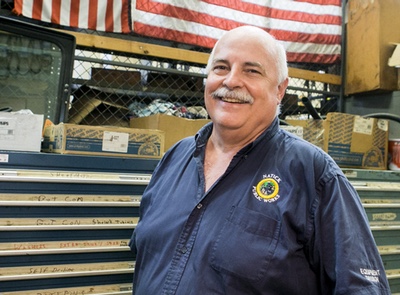
There is no shortage of places to invest the money we saved by working with MAPC, including additional equipment such as hoses and tools to outfit the truck.
Thomas Collins Natick Fleet Manager
As our three-year Sustainable Communities regional planning grant drew to a close in 2014, we commemorated its achievements and on-the-ground change across the region, and turned our attention toward the next five years by crafting a forward-thinking and progressive new Strategic Plan to guide our work. With our mission of promoting smart growth and regional collaboration as the backbone, this new Strategic Plan provides a detailed roadmap to achieving the vision for equity and prosperity laid out in our bold regional plan, “MetroFuture: Making a Greater Boston Region.”
Embedded in our new Strategic Plan are four critical areas of focus to guide us as we work toward a more sustainable, resilient Greater Boston: encouraging development and preservation consistent with smart growth principles; partnering with our cities and towns to promote regional collaboration, enhance effectiveness and increase efficiency; playing a leading role in helping the region to achieve greater equity; and helping the region reduce greenhouse gas emissions and adapt to the physical, environmental and social impacts of climate change and natural hazards. With these four topics as guideposts, we are poised to grow our work into innovative, inclusive new directions while staying true to the core services and expertise that we offer the region's residents, businesses, and elected officials. From land use planning to data, research, education and direct services to cities and towns, we are honored to continue making Metro Boston a national model and regional resource on smart growth and inter-local coordination.
MAPC believes the best way to grow our region is to conserve natural resource and preserve open space while concentrating new development in places where jobs and infrastructure already exist. A key way we do this is by encouraging mixed-use developments to locate in downtown areas and village or town centers, always in alignment with each area's unique local character. Our planners bring an expert and interdisciplinary approach to this work, and have partnered with rural, suburban and urban municipalities to realize these smart growth goals in 2014.
As part of our new strategic plan, we are engaging with more cities and towns on master plan projects, including in Ashland, Boxborough and Woburn, and to do an economic development plan for Reading and for Stoneham.
We also worked with two state agencies—the Executive Office of Housing and Economic Development (EOHED), and the Executive Office for Energy and Environmental Affairs (EOEEA)—to conduct a regional study of land use opportunities north of Boston. This Metro North project identified areas in Chelsea, Everett, Malden, Medford, Melrose, Revere, Somerville, Winthrop, East Boston and Charlestown that are ripe for new housing, employment growth, open space, and the infrastructure improvements necessary to support such growth.
In total, MAPC has worked with 52 cities and towns to map priority areas for development and preservation across the region, and we've added capacity on our housing team to respond to the resulting need for local housing production plans, residential zoning bylaws, and housing studies. We also hosted a day-long summit on value capture techniques to emphasize our new focus on ways of financing smart growth development last year, and our executive director serves on the state commission tasked with bringing innovative methods to recover value from public infrastructure for private landowners.
In Somerville, we further refined our economic analysis north of Boston to include a comprehensive study of the effects the Green Line Extension may have on housing, income diversity and displacement of longtime residents in that historically working-class city. Our research showed which areas were most at risk for dramatic increases in rent and land values as a result of the transit expansion, and recommended ways that the city and community partners could mitigate these impacts, including incentivizing housing production and planning proactively for preservation of affordable units.
This work continued in Revere's Shirley Avenue neighborhood, a lower-income area near Revere Beach where the city is aggressively pursuing new development. MAPC worked with Revere officials and residents to lay out a plan for preventing displacement and stabilizing existing businesses; action steps from this community effort are already being implemented.

Thomas Collins Natick Fleet Manager
For more than 50 years, MAPC has been a leader in innovative transportation planning, policy and project work. We have focused our work on residential and commercial transit-oriented development, around subway and light rail and critical bus connections, as well as on promoting innovative parking solutions and street planning for all users. This year, we brought a special focus to the creation of Complete Streets, which are streets that are designed for everyone: they are safe, convenient and accessible for pedestrians, cyclists, transit users and motorists, and are comfortable and barrier-free for people of every age and mobility level.
This year, MAPC helped Acton, Everett, Littleton, Maynard, Middleton, Reading, Salem, Somerville and Stoughton to pass “Complete Streets policies,” which allow cities and towns to make sure roads are designed, constructed, refurbished and maintained in a way that's inclusive of all users. Littleton's local policy was even recognized nationally with an award from the National Complete Streets Coalition.
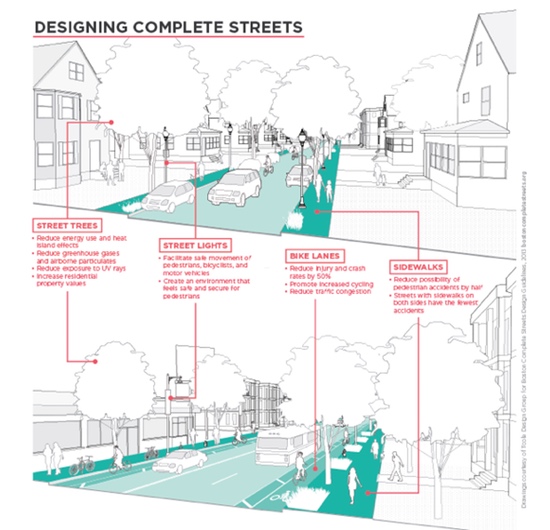
MAPC also worked closely with DCR, the state's Department of Conservation and Recreation, to identify ways the parkway system in Massachusetts can become safer for cyclists and pedestrians. A study began in late 2014 and will continue in early 2015 to review all DCR parkways and off-road facilities, such as the Neponset River Greenway and Watertown Rail Trail, to recommend ways to promote non-car transportation along these historic routes while improving road conditions for drivers. Bike infrastructure will be added as capital improvement projects unfold in the next few years, as a way to enhance public health, improve cycling and walking safety, and preserve and beautify this paths and roadways.
Parking is a critical link between land use and transportation, and parking policies have a tremendous effect on transportation choices and the built environment. Effective parking strategies can also help cities and towns meet their goals around affordable housing, reducing pollution, improving residents' health and attracting good development. MAPC assists communities in turning parking challenges into assets.
This year, we brought together leaders and innovators in the parking field at our “sPARKing Ideas” conference in Boston, where planners, elected officials and experts gathered to share ideas and tools for improving parking strategies on the local level. Stream the presentations at mapc.org/parking. In 2015, we will be working with the City of Malden for a downtown parking study, building off our collaboration with the Harvard Graduate School of Design to “Plan Downtown Malden” in 2013, helping that city to reconnect their business district to transit by relocating City Hall and encouraging new transit-oriented mixed-use development. MAPC transportation planners and engineers also worked to study parking in Cohasset Village, Downtown Foxborough and Grove Hall this year. In addition to diagnosing and recommending solutions for parking dilemmas, MAPC has also begun helping municipalities purchase the latest technology in parking meters this year, including smart meters and pay-by-phone services.
Marc Draisen MAPC Executive Director
Massachusetts has a robust food system and a proud tradition of buying and eating local. However, the system faces real challenges: despite enjoying great growth and increasing diversity in recent years, our farmer population is aging, and we must work harder to replenish with the next generation of farmers in order for our output to keep pace. Additionally, we must look for ways to address the problem of size: most Massachusetts farms are smaller than 50 acres, posing economic challenges that we will have to overcome if we want to grow and eat more of our own food. MAPC is working with a coalition of allies led by the state's Department of Agriculture to address these issues as part of the state's first comprehensive food plan since the 1970s. Learn more at our food plan website and get involved on twitter at @mafoodplan.

2015 saw many exciting changes in water policy and infrastructure planning Massachusetts. A major piece of legislation, the water infrastructure finance bill, was enacted in July, increasing the amount of low- and no-interest loans available to cities and towns for water infrastructure improvements. Under the law, the state will also match municipal entry fees for regional water systems like the MWRA, and allows cities and towns to establish a water surcharge of up to 3 percent to fund repairs for aging pipes. MAPC worked hard to push for this bill, and we will help staff a commission set up to monitor the condition of the state's deteriorating water infrastructure, which required unfunded repairs to the tune of $21.4 billion over the next 20 years.
MAPC's legislative division works annually to shore up support for the Shannon Grant, which works with at-risk youth in cities and towns struggling with gang violence and crime, and to staff the Metro Mayors Coalition, a group of 13 communities whose leaders come together to troubleshoot and share solutions to common problems. This year, the coalition focused on common-sense strategies for reducing gun violence in cities, policies around rideshare programs such as Uber and Lyft, cohesively tackling climate change preparedness, and regionalizing emergency communications.
In the wake of this fall’s ballot question de-indexing the gas tax from the rate of inflation, an estimated $1 billion of transportation revenue will not be collected over the next decade, so MAPC and allies across Massachusetts will have more advocacy work ahead to help stabilize and support public transit and infrastructure improvement funding. Other legislative goals for 2015 will center on modernizing parking regulations and allowing for regional transportation ballot initiatives around the region, while keeping a continued focus on working successfully with the incoming gubernatorial administration.
Public health, increasingly seen as a core discipline within professional planning, has grown as an area of expertise for MAPC in recent years. This year, our public health division wrapped up the third and final year of its Community Transformation Grant (CTG) for Middlesex County, a project that brought healthier food into neighborhoods with limited access to affordable fresh groceries, changed policies and practices around building streets for all forms of travel, and promoted smoke-free housing conditions in public units across the state. Building on these substantial successes, the public health team is shifting into a “Health in All Policies” approach to integrating lessons learned from CTG into our broader planning work. Working with other staff at MAPC, the public health team will explore ways to expand use of bike share (such as Hubway) among minority and lower-income residents of the region, and has already conducted several focus groups on the issue in late 2014. In Somerville and Chinatown, our staff is working with residents who live near highways to study the effects of roadway pollution in collaboration with Tufts University researchers, with an eye toward making policy and development changes to mitigate negative health impacts of living near high-volume traffic and related air pollutants.
This past summer, the public health division combined traditional place-based planning with a pilot “photovoice” project, which offers residents the opportunity to show via digital photography the assets and drawbacks of their neighborhoods, as a way to visually showcase opportunities for better planning. A photovoice project in East Boston engaged underrepresented residents in the photography project, offering them a voice in deciding which unsafe intersections, sidewalks, plazas and roads should get attention from the city. Boston will consider the areas identified using photovoice for funding toward safety improvement in 2015.
A similar placemaking photovoice project in Malden this year won a Social Advocacy Award from the Massachusetts Chapter of the American Planning Association alongside local health partner “Malden is Moving.”
Democratizing data remains a core service MAPC provides to cities, towns, residents, journalists and researchers. This year, our Data Service staff created a new version of our DataCommon website for Central Massachusetts. This next generation of the DataCommon features a new design with added features such as downloadability and cataloging. The Boston area will get an enhanced DataCommon in 2015 thanks to continued support from the Boston Foundation. MAPC’s Data Center is also building up the development database this year at MAPC’s Development Database. This site catalogs current and planned development projects and helps our staff track the region’s growth and forecast its future around housing and employment.
This summer, our Data Services staff debuted the Housing MA: The Massachusetts Housing Data Portal, a groundbreaking website rich with housing figures on every municipality in the state. Featuring information on demographics that previously took weeks to generate, this new portal allows citizens and experts alike compare towns with their neighbors and to access visualizations, statistics, text and metadata at the click of a button, with full downloads available and staff support from MAPC just an email away.
Finally, in addition to these new areas of work, our data staff continues to provide modeling and indicators training nationally, and trains users locally in accessing the latest Census figures and the MetroBostonDataCommmon. Trainings are offered every month; find the next one at mapc.org.
MAPC has piloted the notion of integrated energy planning for Greater Boston over the last few years. Our Clean Energy division provides a range of technical assistance services to communities, including comprehensive local energy planning, energy-related technical assistance, and regional procurement. Our goal is to advance markets for clean technology while reducing greenhouse gas emissions and dependence on fossil fuel consumption. Our Local Energy Action Program (LEAP) helps communities plan and implement local clean energy projects, and we also offer solar development, LED streetlight retrofits, and expertise to help cities and towns share energy staff. We currently have 17 communities in our collective procurement to bring solar to municipal rooftops, ground mounted arrays and parking canopies, and we have helped 16 cities and towns to select a contractor to complete LED streetlight retrofits, with five more coming in 2015. Together, completed retrofits have replaced upwards of 15,000 traditional streetlights in Arlington, Chelsea, Natick, Sharon, Winchester, Woburn and soon Somerville, saving approximately 5.5 million pounds of carbon dioxide equivalent emissions annually.
A great first step toward getting involved with MAPC’s clean energy services is to visit our online Clean Energy Toolkit which has step-by-step instructions for instituting a clean energy strategy in your city or town.

One of the many ways we help cities and towns save money is to assist them in creating regional partnerships with their neighbors. Often, smaller towns and cities lack the resources to provide full time services for every local department, so we help them form regional entities for such services as energy planning, public health, public safety and more. MAPC staff is working with a group of policy chief and town officials in MetroWest to regionalize animal control services this year. We are studying facilities, personnel, equipments costs and scope of services already provided, and will recommend a plan of action for Ashland, Framingham, Hopkinton, Holliston, Sherborn, and Natick to combine animal control.
The state’s Executive Office of Public Safety will continue engaging MAPC as fiduciary agent for the Homeland Security Program in Massachusetts, giving us oversight of the state’s central, northeast, southeast and western Homeland Security regions. We provide management, administrative, and planning support to these four regions and their local advisory councils. We also work with our counterpart regional planning agencies (or RPAs) in those areas, including the Central Massachusetts Regional Planning Commission, Southeastern Regional Planning and Economic Development District, and the Franklin Regional Council of Governments. We look forward to continuing our work with EOPSS and the Homeland Security Regions to enhance emergency preparedness capabilities at the state, regional, and local levels.
Our municipal collaboration team also works to secure cost savings for public works, police, and fire departments across Eastern Massachusetts through our collective purchasing program. This year, orders for fire apparatus and ambulances totaled $25.5 million, or 73 pieces of equipment. On the police and DPW side, total sales numbered $29.5 million in 2014, or 757 units ranging from police vehicles to public works trucks.
As part of this work, we facilitate the Northeast Region Homeland Security Advisory Council, or NERAC. NERAC operates three “cache” sites packed with equipment designed to help the region respond to natural and man-made disasters. These three sites, in Beverly, Lexington and Framingham, keep resources such as road signs, generators, cots, light towers and more at the ready for cities and towns to use in times of emergency. More than $2.4 million has been invested into this system to provide resources that are too costly for individual municipalities to purchase and maintain, keeping the region safer for all residents and better equipped to respond to major events.

Effective community engagement is central to the way we do all our work. We strove this year to enhance our role as educators and engineers of inclusive planning processes by piloting newer, more effective ways of gathering public input and reaching under-represented communities this year—including communities of color, lower- and moderate-income groups, youth, the elderly, and those with language isolation.

In our work in Downtown Framingham and along Boston's Fairmount corridor, we used techniques such as translation, interpretation, open house meeting formats and leading community tours to increase engagement and participation.
Internally, we are helping our staff to share effective engagement techniques through “talkshops” over lunch and a brown bag series on knowledge sharing. We've also stepped up our efforts to track how well our work promotes and advances equity in the region, and will be unveiling an interactive online map this year for the public to see how and where we are doing our work.
Building off the momentum and success of our Sustainable Communities regional planning grant, MAPC has this year opened up new opportunities for cities and towns to contract with our staff for technical assistance. Upwards of 10,000 people participated in public meetings for Sustainable Communities projects in our region, and we are eager to continue building off the success of that program in implementing our bold regional plan, MetroFuture. Our new Planning for MetroFuture program will fund dozens of new local projects in 2015, helping us to continue promoting smart growth and regional collaboration for all who live and work in the 101 cities and towns of Metro Boston.

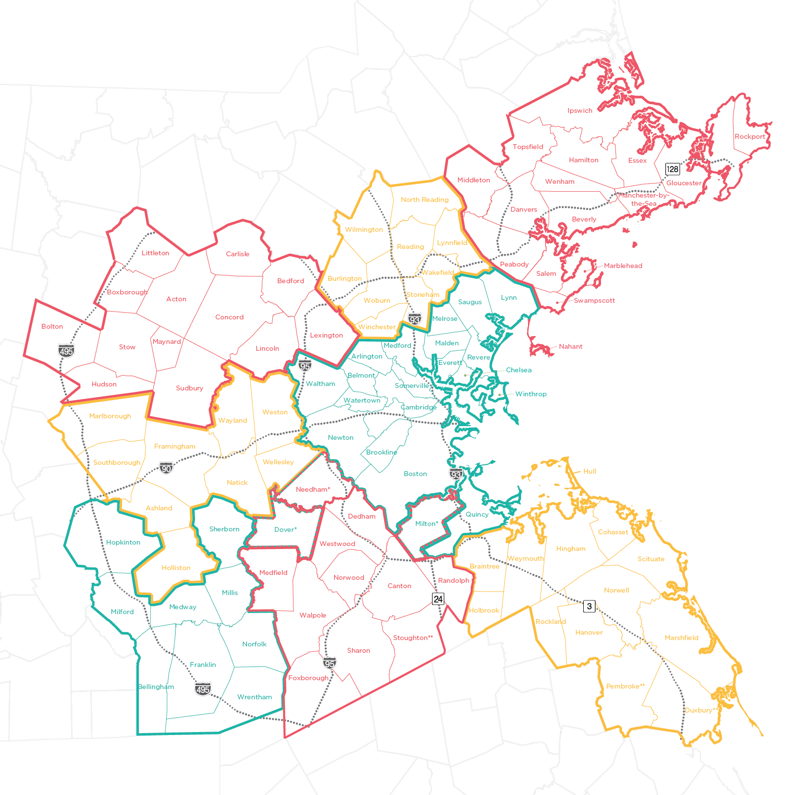
Inner Core Committee
The ICC consists of representatives from twenty-one of the metropolitan area’s innermost communities: Arlington, Belmont, Boston, Brookline, Cambridge, Chelsea, Everett, Lynn, Malden, Medford, Melrose, Milton,* Needham, Newton, Quincy, Revere, Saugus, Somerville, Waltham, Watertown and Winthrop. The Boston Redevelopment Authority and the Metropolitan Area Planning Council are also voting members of the Committee.
MetroWest Regional Collaborative
The MetroWest Regional Collaborative (MWRC) serves the MetroWest region of Eastern Cochituate Aqueducts, Natick, Mass.Massachusetts, from I-95 to I-495 along the Route 9 corridor. MWRC serves as a think tank and advocate for locally initiated regional solutions to policy and planning challenges shared by MetroWest communities.
Minuteman Advisory Group on Interlocal Coordination
Minuteman Advisory Group on Interlocal Coordination (MAGIC) is a group of thirteen communities northwest of Boston working collaboratively on issues of regional concern. Established as a growth management committee in 1984, it has become a respected voice in regional decision-making. MAGIC consists of representatives from the following thirteen communities: Acton, Bedford, Bolton, Boxborough, Carlisle, Concord, Hudson, Lexington, Lincoln, Littleton, Maynard, Stow, and Sudbury.
North Shore Task Force
The North Shore Task Force (NSTF) is a group of 16 communities north of Boston working collaboratively on regional issues. The goal of NSTF is to cooperate with, and to assist, each member municipality in coordinating its planning and economic development so as to obtain maximum benefits for the North Shore district.NSTF communities include Beverly,Danvers,Essex, Gloucester, Hamilton, Ipswich, Manchester-by-the-Sea, Marblehead, Middleton, Nahant, Peabody, Rockport, Salem, Swampscott, Topsfield, and Wenham.
North Suburban Planning Council
The North Suburban Planning Council (NSPC) is composed of eight towns and one city that have formed a voluntary association to facilitate cooperative regional planning. NSPC membership includes town managers and administrators, planning staff, and members of Planning Boards and Boards of Selectmen from the following nine communities: Burlington, Lynnfield, North Reading, Reading, Stoneham, Wakefield, Wilmington, Winchester, and Woburn.
South Shore Coalition
The South Shore Coalition subregion comprises 13 towns on the South Shore within the metropolitan Boston area. The towns are Braintree, Cohasset, Duxbury, Hanover, Hingham, Holbrook, Hull, Marshfield, Norwell, Pembroke, Rockland, Scituate and Weymouth. The South Shore Coalition (SCC) consists of member positions, one for each of the 13 municipalities.
SouthWest Advisory Planning Committee
The SouthWest Advisory Planning Committee (SWAP) is comprised of up to twenty members representing ten communities southwest of Boston. The purpose of SWAP is to foster joint and cooperative action concerning transportation, land use, economic development, housing, historic preservation, water resources and the environment. Informed and active cooperation among neighboring communities helps to serve the needs of residents, businesses, commuters and local governments. SWAP's membership consists of the following towns: Bellingham, Dover, Franklin, Hopkinton, Medway, Milford, Millis, Norfolk, Sherborn and Wrentham.
Three Rivers Interlocal Council
The Three Rivers Interlocal Council is composed of thirteen communities south of Boston: Canton, Dedham, Dover, Foxborough, Medfield, Milton, Needham, Norwood, Randolph, Sharon, Stoughton, Walpole and Westwood. Three Rivers takes its name from the three major rivers in the sub-region: the Neponset, Charles, and Canoe Rivers.
REGIONAL COLLABORATION/PUBLIC SAFETY
MetroWest Health Foundation to Fund Nasal Naloxone Programs
Grants and Contracts
$3,667,062
Municipal Assessments
$993,166
Charges for Services
$293,576
Total Operating Revenues
$26,852,122
Interest Revenue
$305
Salaries and Benefits
$2,428,524
Expenses (including project-specific expenses and pass-through*)
$21,505,782
Total Direct Expenses
$23,934,306
Indirect Expenses
$3,043,822
Income (loss) before transfers and other income
($126,006)
Transfers In
$272,000
Operating Transfers Out
-
Total Transfers In
$272,000
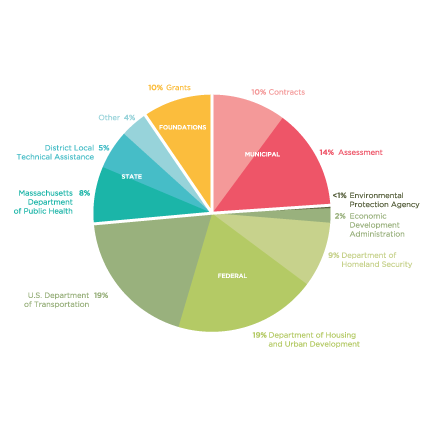
Sources of Operating Funds (total revenue excluding pass-through*)
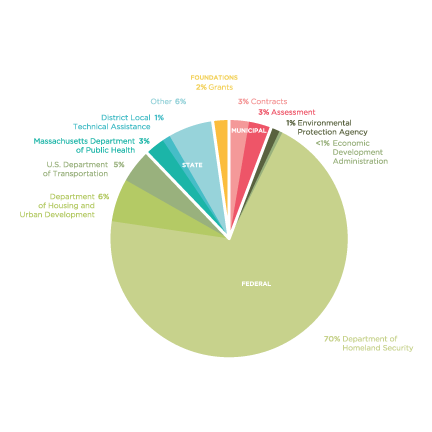
Sources of Operating Funds (total revenue including pass-through*)
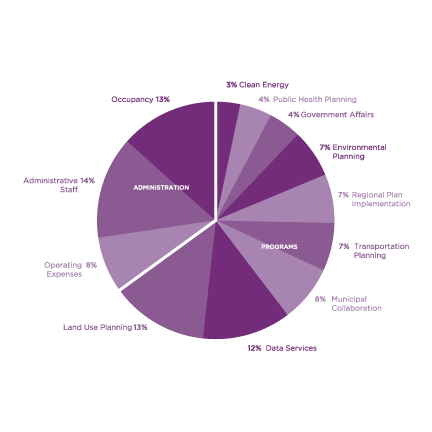
Use of Operating Funds